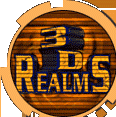The Apogee Legacy #16 - Jason Blochowiak
Today our "Apogee Legacy" Interview series continues on with an interview with Jason Blochowiak. Jason's company "Argo Games" was responsible for the 1996 title, "Xenophage" with us. In addition to Xenophage with us, Jason was also involved back with id Software in the day, and was a co-owner of id for awhile in 1991. Jason did sound code for id games back in the Keen/Wolf era, wrote code for Keen Dreams, etc. So his name should be familiar to fans of our company's Legacy titles.
Xenophage was our lone attempt to get into the fighting game market. Xenophage did bring a lot of firsts into this genre of game. We did try a second fighting game with someone else, but it was never released, so Xeno remains our lone entrant into this style of game. In fact, this interview is coming out at a very timely manner. On April 26, 1996, Xenophage v1.0 shareware was originally released. So this is the 10 year anniversary for Xenophage, and because of that, we also want to announce that we're releasing the full version of Xenophage as freeware to go along with this interview and the anniversary. Read through the interview to get the download link. The Xenophage freeware release also has another tie to our current product. The "Art Director" on Prey is Rowan Atalla, who was Jason's parter in Argo games. Rowan also did art on Xenophage; things have a tendency of coming full circle, don't they? :)
We thought last week's entry in the series by Peder Jungck was the longest in terms of words, but Jason's now holds that record. Jason talks at length about many of the sujects in the interview, including what he's done post Apogee. This is a very long, and very good interview, so make sure to check it out.
Past Pioneers of the Shareware Revolution
Issue #16 - Jason Blochowiak
1) How did you first come in contact with Apogee?
Well, I was around when the Id guys first got going - Jay Wilbur, John Carmack, and I were all living in the same house when Id started. After I left Softdisk, I worked with Id briefly (during the Keen 4-6 & Wolf 3D era) when they were working with Apogee. So that's how I got to know Scott, George, and other Apogee folks. Later on, when I decided to make a fighting game (ultimately titled Xenophage), I contacted them, and they showed interest in helping develop it, and publishing it.
2) Was there a reason you decided to work with Apogee, say versus going on your own or working with another company?
The fact that we all knew each other certainly helped, and Apogee's friendly style of doing business was also a plus. They were also successful enough to help out significantly with funding, which was important for our small studio.
By the way, Xeno was our first experience with "outsourcing" art - it's interesting to see more companies doing that sort of thing these days, and I see them experiencing the same set of issues that we ran into. We ultimately pulled all art production in-house to finish the game, but we wouldn't have been able to get the initial assets in place without the outsourcing effort, and we wouldn't have been able to get those without Apogee's help, both logistically and financially.
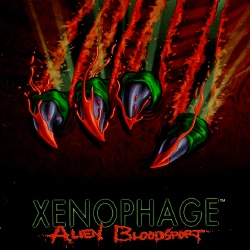
|
| Box cover art for Xenophage |
3) Looking back, was there anything Apogee could have done better, regarding the marketing and distribution of your game?
No, not that I can think of. Apogee's prominence in the shareware industry pretty much guaranteed broad exposure for any titles they released. Keep in mind that this was before the Internet had "gone wide" - it was pretty much only for researchers, academics, and students. So, shareware lived on Bulletin Board Systems (dedicated machines with banks of modems that you'd call into), and shareware catalogs. Because everyone knew Apogee as a premier shareware brand, any shareware releases were quickly disseminated from the original release points (equivalent to current "file mirroring"), and got large amounts of page space in the catalogs.
4) Do you think your game was made better or worse by working with Apogee?
Definitely better. In retrospect, the biggest thing my studio (Argo Games) was lacking in was game design experience, and the guys at Apogee definitely pushed us in the right direction - if anything, we probably would've been better off listening more.
I go into a bit more detail later about this, but I've been hopping between game genres my entire career. This has a number of advantages, but it does sometimes mean that my understanding of a particular genre will be deeper at the end of making a game, rather than at the beginning, when the game is in the planning phase.
5) Apogee had a policy of letting the designer or studio retain full intellectual property rights to their game. Nowadays, it's rare to find a publisher who allows this, especially if the publisher is providing the funding. Do you believe that it's best for the creator to retain IP rights? Why or why not?
As an independent developer, I'd say that it's definitely beneficial for the studio to retain the IP. Of course, the publishers generally have a different take, for fairly obvious reasons.
It seems that the conventional wisdom about this is that the publishers are taking the financial risk, so they should own any resulting IP. This completely ignores the much larger personal risks that people at smaller studios take. The days where everyone at a studio is a scruffy 20 year old, and the difference between the studio doing well or doing poorly means the difference between good beer or cheap beer - that's gone (well, at least for the majority of large-scale professional developers – see #13). Most of us now have mortgages and spouses, and quite a few of us have kids. Not to mention that doing games means working twice as hard for half the pay of other (albeit, far less interesting) jobs.
Of course, the exception to this is where the publisher brings the IP to the table in the first place - either something they developed internally (like, say, extending a franchise into a different genre), or a license that they're shopping to developers.
5a) And if applicable, have you benefited from retaining ownership of your own IP?
It certainly leaves more options open. In the specific case of Xenophage, I don't think it will make a practical difference (see next question), but there are other back-catalog titles of mine where it might - and that's the important thing, that I have the choice, without having to negotiate to release rights with anyone.

|
| Jason and his wife on vacation in Istanbul |
5b) Do you think there'll ever be a sequel to your game(s)?
We're probably not going to be seeing Xenophage II. I mean, it brought some stuff to PC fighting games that hadn't been seen there before - like the zooming playfield that let us have large, detailed character sprites. However, the game really missed striking the right nerve in the gaming public. There were a number of issues with the game, but I think the statement (from some random person on a message board somewhere) that sums up the public's reaction was the the fighters were "too big, and too weird."
6) Is there any story/incident that stands out as interesting during your time associated with Apogee?
Sheesh, it's been almost ten years since Xeno got released, so I'm sure there's plenty of amusing stuff that I've completely forgotten.
7) Apogee was an early pioneer in terms of teaming up with external designers and studios, and continues to do so even to this day (currently working with Human Head Studios on Prey). Why is it that so few other studios do this (mentor and fund outside projects with lesser known teams)?
Clearly the stakes are getting much bigger for front-line titles. The more money is involved, the more conservative people get. As with everything, there are a set of tradeoffs - people at smaller studios tend to be more devoted to getting it right, compared with "gameplay programmer #47" at the bigger places.
8) What the biggest difference in the industry nowadays versus when you worked with Apogee?
The biggest thing would have to be the money. Back in the day, 3-5 people could put out a front-line game in well under a year, with budgets that were in the low hundreds of thousands, if even that much. The last two projects I worked on before I left Midway had budgets that were, well, I'm not allowed to tell you the exact numbers, but both had 8 digits to the left of the decimal point.
Things are also more, well, deliberate. With bigger projects and more people, much more planning and logistics are required now. Everything was a lot more cavalier back then - it's been interesting watching the game industry go through the process of maturing.
9) What have you been doing since your time with Apogee?
(Pardon the relative long-windedness here - more than two-thirds of my gaming career has been after Xenophage was published!)
Awhile after Xeno was released, I decided to try a somewhat different career path - I hadn't ever worked for a larger company, so I joined Midway at their Chicago studio.
I've been pretty happy that I've been able to work on so many different game genres - puzzle (Rescue Rover 2), platform (Keen), fps (Wolf3D), board (Hexxagon), trivia (Trivia Shell), fighting (Xenophage). I hadn't done any arcade games, though. So, after helping out on the tail-end of an arcade gun game (Carnevil), I led the programming effort on an arcade snowmobile racing game (Arctic Thunder). Arctic was a fun game with broad appeal, and it sold well, but the arcade industry in general was on its last legs, so Midway exited the arcade business, and focused entirely on home consoles.
After Arctic, our team pitched a number of concepts to management, and the one that stuck was what turned into "PsiOps - The Mindgate Conspiracy." It was definitely an interesting experience - although I had helped out the people porting Arctic to the PS2 and Xbox, I didn't really have any significant console programming experience. So, starting with a blank page and building a new cross-platform game/graphics engine and toolset for a genre I hadn't done before (3rd person action/adventure), on platforms I hadn't worked on before (PS2, Xbox, and Gamecube), recruiting, managing & directing a programming team larger than ever before (up to 20 programmers, at one point) was, well, to call it challenging would be an understatement. It was an intense few years, but I'm really proud of the game on a number of fronts.
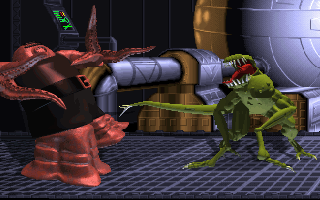
|
| Xenophage Screenshot |
On the anal-retentive side, it's great that the game was so clean (actual professional tester quote - "It's really frustrating when your job is to break the game, but you can't.") that our QA costs were below 50% of the company average, and that we got quick approval from the console manufacturers.
On the "I made that" side, PsiOps garnered the highest aggregate review scores of any title developed internally at Midway, and the second highest of any title ever published by Midway. This at a time when management was really wanting to improve expectations about the quality of the console titles coming from the company.
On the "holy crap, we pulled it off" side, the programming staff started with one programmer (me), added a mix of a few industry vets, some folks with some game experience (but not necessarily a whole lot), and some complete gaming noobs who showed general promise, and came together as a team to make a game we are all proud of.
There is one Chicago restaurant's pizza, though, that none of us ever want to see again. Ever. Really. Not because it was bad, mind you, any food that you eat that much of during months of crunch – you’re just going to get sick of it.
Anyways, after PsiOps, I provided some initial technical direction on a new project ("John Woo's Stranglehold") for next-next-gen consoles, which looks to be on track to really capture the full essence of the cinematic experience of his action films, to a depth that gamers haven't seen before. It's a great team, doing some great stuff, but I'd been at Midway for 7 years, and I guess the 7-year itch set in, so I decided to move on.
So, p1mpage for my new venture: Monster Entertainment! My partners (who are finishing up their current gigs) and I are striking out on our own and starting a new studio. There are a number of factors that shape the culture of a work environment, and we have some very specific ideas about how to (and how not to!) build a studio that's functional, profitable, and a personally rewarding place to work for everyone involved.
Additionally, although the PsiOps engine was a decent enough piece of engineering, it was rooted in my understanding of the world (and software engineering) as of 4 years ago, and I've learned so much since then - it's great to be able to start over fresh, and build new tech that's clean, flexible, and poised to take advantage of the latest crop of PC and console hardware.
As a side benefit of building fresh tech, it's been great fun to brush up my graphics programming skills - even though, at the end of the day, writing HLSL code isn't all that incredibly different than writing VU1 code, and dealing with the PS2 DMA controller and VU1's limited memory looks a lot like dealing with the Cell SPE's "Local Storage." Despite the similarities, the increase in raw power that's available with the current crop of GPUs does make for some interesting possibilities - in particular, I think going for "photo-real" will become increasingly passe, and going beyond it will be a part of the visual branding process for studios.
10) If you're no longer making games, have you thought about returning to this industry? If not, why not?
Well, seeing as I am still making games, I'll reverse the question to "why are you still making games?" The answer is that it's still interesting to me. As I mentioned above, I'm very happy I've been able to avoid doing the same game over and over again. I've had the opportunity to work with a wide variety of hardware, software, and wetware. There's enough continuity of what making games is about, so I'm not totally bewildered as new cycles of hardware come along, but there are enough differences to keep things interesting.
I actually think there are a number of strong similarities between making games, and cooking (which is pretty much my only hobby). Both involve basic technical skills, without which you can't really do anything. They involve the psychology of the consumer. They require foundations in things people are comfortable with, but to be successful you need to introduce fresh elements, and keep evolving.
In the professional sense, for both heading a team or studio's programming effort, and heading a working kitchen, the skills you need to develop reach beyond craftwork. There's a certain magic required to transform a collection of different people, with different technical skills, different educational backgrounds, different levels of social skills, etc., into a functioning team that can deliver under intense pressure. Learning that magic is tricky, but interesting.
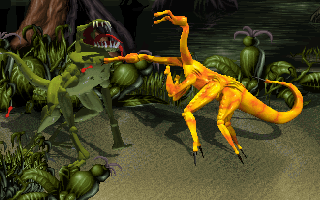
|
| Xenophage Screenshot |
11) Looking back, are there any missed opportunities that you wish you'd have jumped on?
Well, buying more Midway stock when it was at $4.43 and selling it when it was at $23.73 would've been good, but aside from that, not really - I've been really fortunate to have all the opportunities I've had.
12) Other than your game(s), what's your favorite game released or produced by Apogee (or 3D Realms)?
I'd have to say Duke 3D. I hear there's a sequel being worked on, but it hasn’t come out yet.
12a) And what's your favorite 2-4 games released by anyone else?
Half-life 2 was pretty excellent. My first experiences with Steam weren't.
I've had a running love/hate relationship with the Civ series for quite awhile now. More love than hate, though.
Baldur's Gate II is definitely on the list.
Age of Empires III ate at least a couple weeks of my life recently.
13) Is there anything else you'd like to add about your time here or to fans of your title(s)?
Well, I'll take this occasion to ramble a little (more). The Chinese curse of "may you live in interesting times" definitely seems to apply to the game industry.
While AAA game budgets are skyrocketing to levels that frighten anyone with a calculator and a brain, it's also interesting that the actual barrier to entry for making simple games has gone to pretty close to nothing beyond having a PC of moderately recent vintage, and a willingness to learn & put some hard work in.
When I took a gander at the source code archive for Xeno, there were something like 20 variants of a routine to copy graphics rectangles around in different ways, all hand coded in assembly for speed. Now, even the cheapest graphics hardware handles all that, and tons more as well.
You can get an industrial grade C++ compiler for free, including a fairly comprehensive Integrated Development Environment, in the form of the Visual C++ 2005 Express Edition.
The DirectX SDK, by itself, includes a ton of code to springboard from (some of it good, some of it crap), and a bunch of free utilities that easily accomplish what experienced folks were tearing their hair out about not all that long ago. HLSL/Cg is much easier for most people to understand than the previous iterations of vertex and pixel shaders.
There are free image editors (and a bunch of free textures out there). Free modeling and rendering programs (and a bunch of free models). Free scripting languages (why anybody "invents" any more game scripting languages is really beyond my comprehension at this point). Free language parsers (Spirit is interesting to play with). XML can handle a bunch of things handily, and there are free XML parsers, processors, transformers, etc. Free audio compression/decompression - with Ogg Vorbis and OpenAL, I added streaming music/sfx to my new engine in less than a day. Now, granted, I’ve been doing this awhile, but that timeframe had more to do with ease of use than it had to do with experience.
So, with all this available, a determined programmer can put a game together without too much difficulty, and the only difference (albeit an important one) between what a solo amateur can do versus a seasoned team is cranking out professional content with the appropriate level of polish.
What does all this mean? Well, lower barriers to entry means more crap, but it also means that someone out there somewhere can make a little game, get it out there, and actually make money from it – just like back in the day.
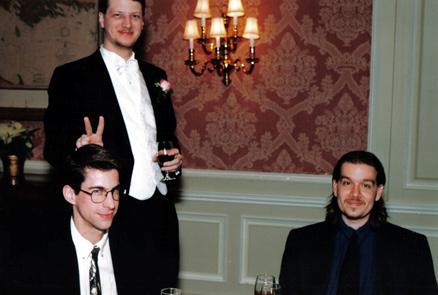
From Jason Blochowiak's Wedding:
Dave Mueller, Jason (standing), & Chris Rhinehart.

From Jason Blochowiak's Wedding:
Jason & Kristin (standing), plus Erika & Rowan Atalla.
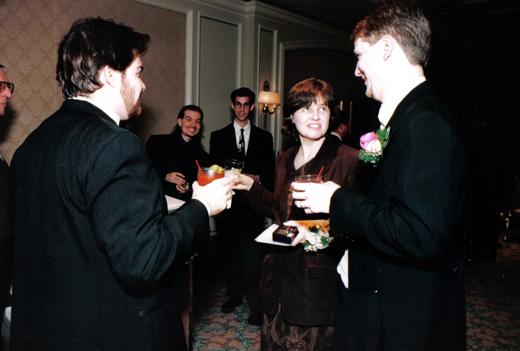
From Jason Blochowiak's Wedding:
Rowan, Chris, Dave, Pat, & Jason
A few words about the people in the pictures from Jason:
- Chris (Rhinehart) - Prey's project lead for Human Head. Fellow Lead Dog programmer with me on the freeware 33-hour insanity project "Duelling Minivans" and the followup "Super Duelling Minivans."
- Dave (Mueller) - At Midway, currently on the MK team, I believe. Worked at Argo after Xeno, before Midway. Currently has my Arctic Thunder arcade machine in his apartment (because none of the doorways in my house were big enough).
- Erika (Ersland) - Kristin's older sister.
- Jason - um, me.
- Kristin - my wife.
- Pat - my mom.
- Rowan (Atalla) - my best man - I believe his current credit is for art lead on Prey. Xeno was his first intro to non-traditional media. Clearly his mastery of the subject has improved with exposure - just take a look at Prey.
Thanks for Jason for writing such a good, long interview. Thanks also to him for allowing Xenophage to be released as freeware. Check out these various links below.
- Our Xenophage Catalog Page
- Full Freeware Release of Xenophage
- Xenophage FAQ by Doug Howell
- Monster Entertainment (Jason's current gig)
Make sure and tune in again next Monday morning, when we bring you the next in our Legacy Interview series.
Posted by Joe Siegler on April 24, 2006 at 12:00 PM | Permalink
| Discuss this story on our forums
News Categories: About 3DR / 3DR Staff | The Apogee Legacy
